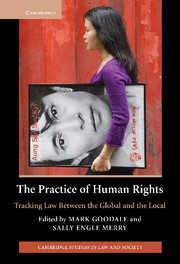Crossref Citations
This Book has been
cited by the following publications. This list is generated based on data provided by Crossref.
Merry, Sally Engle
2006.
Anthropology and International Law.
Annual Review of Anthropology,
Vol. 35,
Issue. 1,
p.
99.
Galemba, Rebecca B.
2008.
Informal and Illicit Entrepreneurs: Fighting for a Place in the Neoliberal Economic Order.
Anthropology of Work Review,
Vol. 29,
Issue. 2,
p.
19.
MERRY, SALLY ENGLE
2008.
Commentary on Reviews of Human Rights and Gender Violence.
American Anthropologist,
Vol. 110,
Issue. 4,
p.
520.
2008.
BOOKS RECEIVED.
International and Comparative Law Quarterly,
Vol. 57,
Issue. 2,
p.
495.
2008.
Books Received.
Current Anthropology,
Vol. 49,
Issue. 2,
p.
354.
Somers, Margaret R.
and
Roberts, Christopher N.J.
2008.
Toward a New Sociology of Rights: A Genealogy of “Buried Bodies” of Citizenship and Human Rights.
Annual Review of Law and Social Science,
Vol. 4,
Issue. 1,
p.
385.
Hodžić, Saida
2009.
Unsettling Power: Domestic Violence, Gender Politics, and Struggles over Sovereignty in Ghana.
Ethnos,
Vol. 74,
Issue. 3,
p.
331.
Berman, Paul Schiff
2009.
The New Legal Pluralism.
Annual Review of Law and Social Science,
Vol. 5,
Issue. 1,
p.
225.
Michaels, Ralf
2009.
Global Legal Pluralism.
Annual Review of Law and Social Science,
Vol. 5,
Issue. 1,
p.
243.
MESKELL, LYNN
2009.
Talking of Human Rights: Histories, Heritages, and Human Remains.
Reviews in Anthropology,
Vol. 38,
Issue. 4,
p.
308.
Eberhard, Christoph
2009.
Au-delà d'une anthropologie des droits de l'homme : Les horizons du dialogue interculturel et du royaume de Shambhala ?.
Revue interdisciplinaire d'études juridiques,
Vol. Volume 63,
Issue. 2,
p.
155.
Goodale, Mark
and
Clarke, Kamari Maxine
2009.
Mirrors of Justice.
p.
1.
Nader, Laura
2009.
Mirrors of Justice.
p.
316.
Sarfaty, Galit A.
2009.
Mirrors of Justice.
p.
131.
Eberhard, Christoph
2010.
Au-delà de l’universalisme et du relativisme.
Anthropologie et Sociétés,
Vol. 33,
Issue. 3,
p.
79.
Megret, Frederic
2010.
International Human Rights Law Theory.
SSRN Electronic Journal,
Hadiprayitno, Irene
2010.
Legal Complexity and State Obligations to the Right to Food: Towards an Analytical Shift of Progressive Realisation.
SSRN Electronic Journal,
Burrell, Jennifer
2010.
In and Out of Rights: Security, Migration, and Human Rights Talk in Postwar Guatemala.
The Journal of Latin American and Caribbean Anthropology,
Vol. 15,
Issue. 1,
p.
90.
Huneeus, Alexandra
Couso, Javier
and
Sieder, Rachel
2010.
Cultures of Legality.
p.
3.
Lykes, M. Brinton
2010.
Silence(ing), voice(s) and gross violations of human rights: constituting and performing subjectivities through PhotoPAR.
Visual Studies,
Vol. 25,
Issue. 3,
p.
238.



